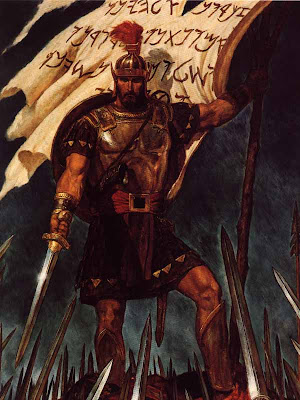I'm busy making final edits on my next book. As I make those edits I thought this is an interesting nugget you might enjoy reading.
When Moroni’s thoughts are summarized by Mormon those thoughts not only suggest his behavior was a preemptive military action, but it was on aggressive side of what just war theorists consider acceptable. Moroni reasoned in the text that Amalickiah would inspire the Lamanites to war in the future when they are stronger. Alma 46:30:
Now Moroni thought it was not expedient that the Lamanites should have any more strength; therefore he thought to cut off the people of Amalickiah, or to take them and bring them back, and put Amalickiah to death; yea, for he knew that he would stir up the Lamanites to anger against them, and cause them to come to battle against them; and this he knew that Amalickiah would do that he might obtain his purposes.
The future tenses are highlighted. Moroni sought to stop Amalickiah from gaining more strength and attacking later so he justified attacking now. Capture and kill him now, before they get more strength and attack us later, is a classic motivation for instigating war, but is more concerned with the future than the present.[1] Micheal Walzer summarized the many theorists of preemptive war and the varying justifications for the practice by using a term called the anticipation spectrum. In that spectrum he suggested that the only just preemptive wars are concerned with the present alarm of an immediate attack such as a charging assailant with sword in hand, nuclear armed planes already on their way to targets, or planes full of terrorists on their way to the Twin Towers. Walzer argues that unjust preemptive wars are concerned with stopping a gathering threat (Sparta, Germany, or the Lamanites will be stronger in the future so Athens, Britain, or the Nephites must attack now), or punishment for past actions (this nation is so unjust, greedy, prideful, ambitious, and aggressively expansionist it is too dangerous not to attack.)[2]
By this measure Moroni’s use of preemptive war is more
expansive than most just war theorists concerned with the imminent
threat, because Moroni focused on the future threat and not the present. This
leaves most students of the Book of Mormon in a unique situation, especially
for those that use the infection
model and place restoration scriptures as always superseding non-LDS
theorists. Because in this case Moroni and the Book of Mormon seem more
aggressive and less justified than what many commonly assume, especially
compared to just war theorists that moderate the practice of preemptive war.
This additional analysis becomes a much-needed caution to those that fail to do
what Brigham Young advised and find truth even among professed
infidels. There is much more in my book about theory and practice, and
Walzer’s description serves as an excellent summary of just war theories
regarding preemptive war as I discuss those details. In short, his desire for
seeking battle places him on the aggressive extreme of justified preemptive war
and serves as a reminder of the immense benefit of studying the great thinkers
on the topic.
*****
Thanks for reading. If you found value in this work please consider donating using the paypal button below. Or you can buy one of my books in the top left. At the very least, follow my blog or my author page on Amazon for updates on the book.
[1]
Graham Allan, “The Thucydides trap,” Foreign Policy, June 9th,
2017, https://foreignpolicy.com/2017/06/09/the-thucydides-trap/
(Accessed, May 14th, 2024.)
[2]
Micheal Walzer, Just and Unjust Wars, 81.







No comments:
Post a Comment